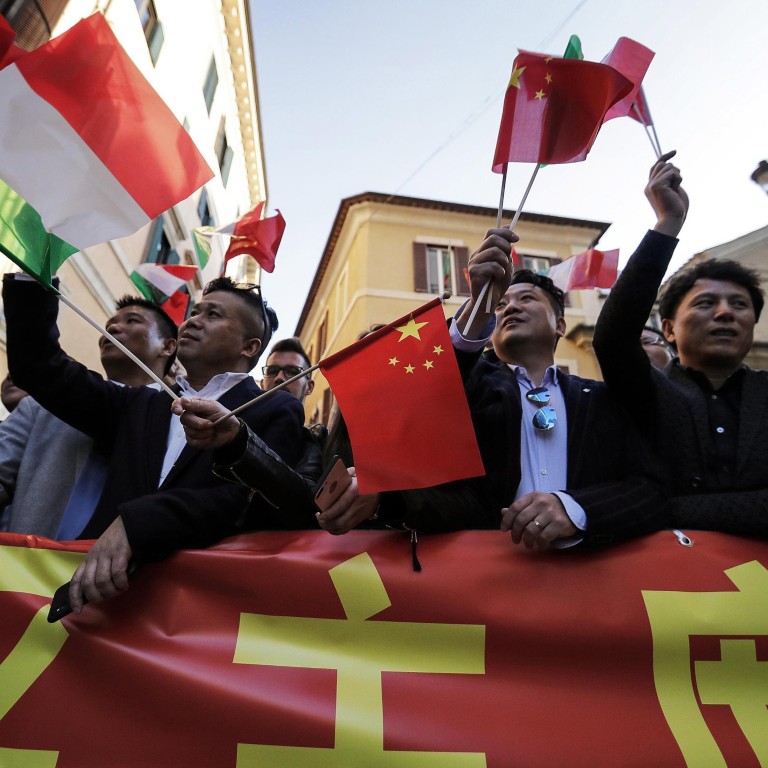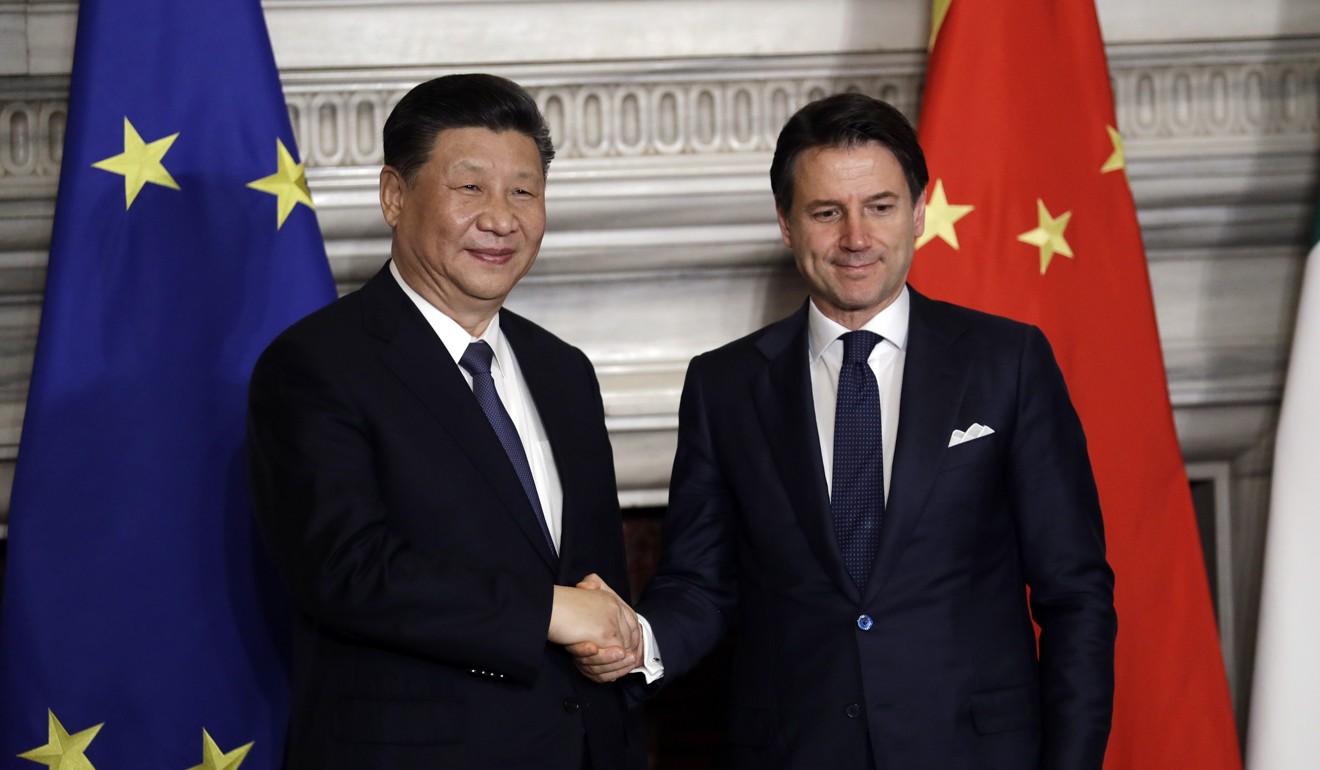
Italy’s move to join New Silk Road may see European Union tighten coordination on China
- EU wants member states to speak with one voice on China issues, analyst says
- Italy faces internal and external criticism for its decision to side with Beijing
Italy’s decision to join Beijing’s multibillion-dollar “Belt and Road Initiative” may prompt the European Union to tighten its coordination on China amid growing scrutiny of its efforts to expand its global clout, analysts say.
Among the 29 other agreements signed in Rome during a state visit by Chinese President Xi Jinping were two port management deals between the China Communications Construction engineering company and the ports of Trieste, situated in the northern Adriatic Sea, and Genoa, Italy’s biggest seaport.
The agreements also cover areas such as satellites, e-commerce, agriculture, beef and pork imports, media, culture, banking, natural gas and steel.

Italy’s decision to join the controversial belt and road programme has been heavily criticised at home and abroad. Critics said the move helped to legitimate China’s geopolitical ambitions, with the heavy borrowing for infrastructure spending creating a “debt trap” for participating nations.
The Italian government has also met with a domestic backlash from its own politicians. Deputy Prime Minister Matteo Salvini, who heads the Northern League faction in the coalition government, did not attend the signing ceremony in protest of the deal.
“The investment should only be allowed on equal terms … Don’t tell me that China is a free market,” Salvini said on Saturday after the ceremony.
The belt and road scheme has long been accused of serving China’s political agenda to replace the United States as the world’s top global power broker.
French President Emmanuel Macron was forceful in describing the change in attitude towards Beijing among many European nations, saying on Friday that the “time of European naivety” on China was over. “For many years we had an uncoordinated approach, and China took advantage of our divisions,” Macron said, calling for stricter rules on Chinese investments in the European Union. German Chancellor Angela Merkel expressed a similar view, according to reports.
Italy’s participation sparked an outcry in Germany on Sunday, including a call by the EU’s budget commissioner, Gunther Oettinger, for the European Union to block such deals with a veto.
German Foreign Minister Heiko Maas also criticised Italy.
“In a world with giants like China, Russia or our partners in the United States, we can only survive if we are united as the EU. And if some countries believe that they can do clever business with the Chinese, then they will be surprised when they wake up and find themselves dependent,” Maas told Welt am Sonntag newspaper.
“China is not a liberal democracy,” he added.
In a paper released earlier this month, the European Commission urged its leaders to adopt a 10-point action plan that would establish a more balanced and reciprocal relationship with China in areas such as trade and technology. In the document, China was for the first time labelled an “economic competitor” by Brussels and “a systemic rival promoting alternative models of governance”.
Lucrezia Poggetti, a research associate at the Berlin-based Mercator Institute for China Studies, noted the sharp turnaround in the priorities of the new Italian government. “The current Italian administration is taking a step closer with Beijing in politics, in a bid to maximise its economic opportunity … it’s a remarkable shift from the previous administration where it prioritised the coordination with the rest of the EU states,” Poggetti said.
“Italy’s participation would have certainly alarmed the EU, as Italy is a founding member of the union and has the third-largest economic size … It is potentially more consequential than that of other European states that have already joined [the initiative],” Poggetti said.
She added that the EU wanted “to speak to China in one voice” with greater coordination.
“Brussels would want to make the member states to stay in the loop, to have a voice in unison, for pursuing a more balanced China strategy,” she said.
Debt-laden Italy eyes China’s belt and road, risking more than just the wrath of Donald Trump and the EU
Washington may go further to send a message to other EU member states.
Sean King, a former US government official who is now senior vice-president of political strategy firm Park Strategies, said Rome’s move to join the belt and road plan would make the US “tighten up on and push back against Italy”.
Earlier this month, the White House’s National Security Council expressed concern over Italy’s position, tweeting that “endorsing [the initiative] lends legitimacy to China’s predatory approach to investment and will bring no benefits to the Italian people”.
King said Washington “can’t stop anything that European countries want to do”.
“However, I sense Europeans in general becoming more wary of inbound mainland Chinese largesse than they were even just a year ago,” he said.
Why ‘win-win’ New Silk Road deals with Italy and France are within Xi Jinping’s grasp
But Chinese diplomatic observers said Italy’s decision was another demonstration that China’s growing clout would be “hard to stop”.
“[The belt and road scheme] can afford to use generous economic incentives to shape others’ choices. Therefore, it is possible that more EU countries, especially in Eastern Europe, may join,” said Zhang Baohui, director of the Centre for Asian Pacific Studies at Lingnan University in Hong Kong.
“I don’t think Italy’s decision will make the EU more hawkish [towards China]. This is because the EU does not really have a common foreign policy – each country runs its own China policy. In fact, all the major members, like Germany, France and the UK, are seeking good ties with China,” Zhang said.
“It is important not to forget that both Macron and Merkel have major differences with Trump on global governance and rules of international relations … China’s EU policy is working rather well.”
Xi is on a six-day trip to Europe, as he tries to ease concerns about Chinese investment in the region.
After leaving Italy, he stopped at the nearby principality of Monaco, where he was received by Prince Albert II and Princess Charlene. He later on Sunday arrived at the airport of the iconic resort city of Nice, France, accompanied by his wife, Peng Liyuan, and was welcomed by French Foreign Minister Jean-Yves Le Drian and an honour guard.
Amid tight security, Xi and his wife were to join Macron and his wife for a private dinner later Sunday for what a Chinese official termed “a deep exchange of views on Sino-French, Sino-European relations and international and issues of mutual interest”.

